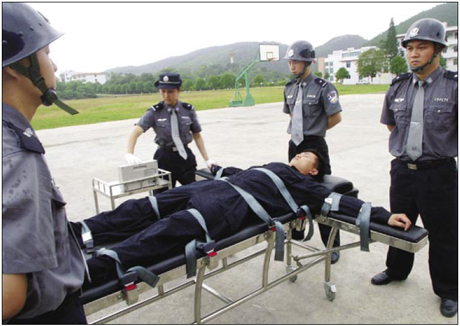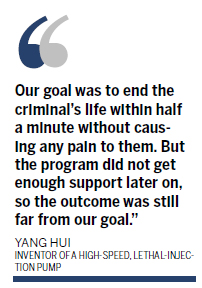Tech
An inventor of death in regret
By Zhao Yanrong (China Daily)
Updated: 2010-07-26 14:39
 |
Large Medium Small |
|
 Police practice a mock execution by lethal injection in Nanning, Guangxi Zhuang autonomous region, in this file photo. Provided to china daily |
BEIJING - Unlike most inventors of medical equipment bent on saving lives, Yang Hui created a device that ends people's lives, albeit peacefully.
Yang, 39, is the inventor of a high-speed, lethal-injection pump and the sole supplier of the pump to local intermediate courts. But not only is he dissatisfied with his product, which he invented in 1998, he's unhappy with capital punishment itself.
"If someday we don't have capital punishment anymore, it might be a real improvement for protecting a criminal's rights," he said.
Capital punishment and lethal injections have been thrust back into the spotlight after Wen Qiang, the former director of the municipal judicial bureau in Chongqing, Southwest China, was executed by lethal injection on July 7. Beijing and Liaoning province in Northeast China also made news about capital punishment after each region stopped using firing squads as its primary means of execution.
At the center of the spotlight is Yang, who doesn't have any medical training but an electronics engineering degree from the University of Electronic Science and Technology in Hangzhou, capital of East China's Zhejiang province.
At the age of 27, he was running a medical-equipment company in Hangzhou. In 1998, he applied to take up a program by the Chinese government to invent a lethal injection device.
The year before, the code of criminal procedure was revised in China and lethal injection was written into the law as one of two means of capital punishment, along with execution by firing squad. Criminals were not given notice of what type of execution would be handed out.
Four drug dealers were executed by lethal injection in Kunming, Southwest China in November 1997. It was the first execution by injection in China. The injection was administered with a simple syringe.
Yang took up the program partly because of what happened when he was 6 years old. He said he had witnessed the execution of a friend's father's in his hometown in the Guangxi Zhuang autonomous region in South China. The 30-year-old farmer killed a man who had an affair with his wife.
The police pushed the man to kneel down on the ground and fired a bullet into his head. With a bang, the young man fell on the ground all curled up. He tried to stand up but after another gunshot, the body stopped twitching.

Yang said he remembers being frightened. The last miserable smile from the young man is an indelible memory for Yang and it encouraged him to create a safer means of dying.
When the invention program came up in 1998, Yang predicted a big market for injections that required more than 1,000 injection pumps with more than 300 intermediate courts in China eligible to implement capital punishment.
Yang and his team created the first high-speed injection pump in 2000 and it was quickly used throughout China. According to government policy, the number of deaths by capital punishment is not released.
But many years later, he still believes the equipment hasn't performed as well as he and his team expected.
"Our goal was to end the criminal's life within half a minute without causing any pain to them," he said. "But the program did not get enough support later on, so the outcome was still far from our goal."
He also said that a lot of change within local governments has created a lot of flux for his business. That has "had a significant influence on our program's consistency," Yang said.
"As a businessman, my creation did not provide me with more benefits," he said. "Actually I have lost a lot of money through this line of work. We stopped producing new equipment four years ago because the more equipment we sold, the more money we lost in the business. We currently only provide maintenance service to the injection pumps."
Though he refused to talk in detail about his invention and its repercussions, he did mention that some local governments from less developed areas are not able to pay for his device, one of the downsides to his business.
"One set of lethal-injection equipment costs more than 200,000 yuan ($29,000), which is way higher than the cost of execution by shooting," said Xu Jiusheng, a professor at the China University of Political Science and Law.
There is also the strong psychological consequences for administers of the injection. Judicial officers are reportedly under an enormous amount of pressure when they implement the injections. Some have complained that they have felt dizzy from the vapors from the contents of the injection: sodium cyanide.
Xu said all prefecture-level cities in China are equipped with the lethal injection system.
"Lethal injection protects the criminal's dignity, even in their last moments," he said. "At least we help keep the bodies untouched and unwounded."
Lethal injection should be considered as the first option of execution even if that priority is not written into the law, Xu said.
But years after his invention, Yang still has what he says is an indescribable feeling toward executions.
"They still get executed and the outcome is not much different from shooting," he said.
China Daily